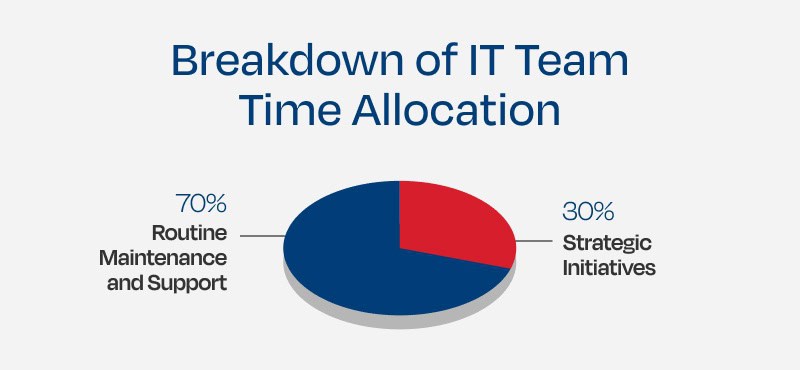In today’s cutthroat marketplace, Information Technology is pivotal in enhancing productivity and steering growth. IT teams are shouldering an unprecedented demand for services while contending with dwindling resources.
Sounds familiar? It is the classic conundrum corporate IT leaders face—the age-old dilemma of whether to maintain an in-house IT team or opt for expert-managed IT services. Our in-depth guide is your compass in navigating the terrain of in-house versus MSP. We unravel their benefits to help you make the right choice.
Exploring the Intricacies of Managed Service Providers
A Managed Service Provider (MSP) is an organization that provides a range of IT services for other companies across various industries. The services aim to enhance and maintain IT infrastructure, operations, and security.
Partnering with an MSP allows you to offload specific IT-related workloads and gain expert guidance to fill in the gaps when your internal resources are inadequately equipped.
However, one of the biggest highlights is that MSPs are not confined to a single provider, specific software, or service. This adaptability makes it possible to find the perfect match for your company. MSPs bring to the table:
- Network Monitoring and issue prevention.
- Cybersecurity and data protection measures.
- Specialized cloud computing and storage services.
- Help desk and end-user assistance.
- Strategic advice and project management.
- Device tracking management of business endpoints.
- Comprehensive IT infrastructure support.
As you consider hiring an MSP for your IT requirements, it is time to explore how you can benefit from this partnership.
The Advantages of Hiring MSPs
Enhanced Security and Compliance
MSPs help businesses stay ahead of cybersecurity threats and compliance regulations. By keeping IT systems updated, MSPs enhance data protection and ensure adherence to industry-specific regulations.
Cost Savings
Partnering with an MSP offers significant cost savings compared to maintaining an in-house IT team. Most MSPs operate on a subscription model, providing predictable monthly IT services that benefit small to mid-sized businesses.
Specialized Expertise
MSPs provide access to a diverse range of IT specialists in areas such as cybersecurity and cloud computing. This allows businesses to leverage expert knowledge without the costs of hiring individual specialists.
Flexible Scalability
MSPs enable businesses to easily scale IT services based on their needs. Whether experiencing growth or seasonal changes, MSPs can quickly adapt to fluctuating workloads, offering unmatched flexibility.
24/7 Monitoring and Support
With round-the-clock monitoring and support, MSPs ensure continuous protection for businesses. They proactively identify and resolve IT issues, minimizing downtime and disruption to operations.
What Is In-House IT & What Are Its Pros & Cons?
An in-house IT team comprises carefully selected professionals from within a company entrusted with its IT infrastructure. They are responsible for:
- Identifying and addressing the tech requirements.
- Maintaining operational efficiency for smooth functioning.
- Ensuring the IT resources align with the company’s strategies.
- Managing cybersecurity, software, hardware, and networks.
- Providing help desk assistance and IT paraphernalia.
- Managing data and creating insightful IT strategies.
Benefits of Hiring & Maintaining Your IT Team
- Full Control and Visibility: Better control over hardware, software, and staffing.
- Experienced staff: Efficient problem-solving, but potential resistance to change.
- Seamless collaboration: Quick issue resolution through internal communication.
- Custom-Built Infrastructure: Builds and maintains tailored IT infrastructures to meet business-specific needs.
The Drawbacks of An In-House IT Team
- High costs: Full-time IT team strains the budget with various expenses.
- Resource limitations: SMBs may lack access to the latest tech and tools.
- Expertise gaps: In-house teams often lack specialized skills.
- Staffing challenges: Difficult recruitment leads to overwork and burnout.
- Growth constraints: Scaling internal IT requires significant investment or overloading staff.
MSP vs. In-House IT: Detailed Comparison by Business Size
MSPs and in-house IT teams offer distinct advantages for different business sizes. This comparison shows how each approach suits companies of various sizes and categories.
| Business Category & Size | IT MSP | In-House IT Team |
|---|---|---|
| Small Businesses(1-50 employees) | MSPs are an ideal choice for small businesses due to cost-effectiveness, scalability, and access to expertise, offering predictable costs for limited budgets. | In-house IT is less practical for small businesses due to high costs and limited resources |
| Medium Businesses(51-250 employees) | MSPs provide cost savings, 24/7 support, advanced cybersecurity, and scalability, making them highly suitable for medium businesses. | In-house IT allows direct communication with staff, but challenges exist in expertise and resource allocation. |
| Large Businesses(251+ employees) | MSPs provide specialized skills, disaster recovery, and compliance management, though large businesses often benefit more from in-house IT. | In-house IT enables custom strategies and better alignment with business goals, despite higher infrastructure and personnel costs. |
So, What’s Your Choice: MSP or IN-House IT Team?
While both MSPs and in-house IT teams have their merits, MSPs offer distinct advantages in terms of cost, expertise, and flexibility.
An internal IT team may provide access to professionals who are familiar with your company’s IT ecosystem, allowing them to adapt to your growth and respond to challenges effectively.
Managed Service Providers, on the other hand, bring extensive expertise and offer cutting-edge security technologies that many internal teams may lack the resources or knowledge to implement. Additionally, MSPs can scale their services as your business grows, addressing new security challenges without requiring significant internal investment.
However, to make an informed decision, it’s crucial to understand how IT time is typically allocated in organizations.

The latest report provides valuable insights into how IT teams allocate their time and resources.
Here are the key findings:
Routine Maintenance and Support: IT teams dedicate a significant amount of their time—60-70%—to routine maintenance and support tasks. This includes:
- Troubleshooting issues
- Performing system updates
- Providing user support
Strategic Initiatives: Only 20-30% of their time is spent on strategic initiatives. These initiatives typically involve:
- Digital transformation projects
- Innovation efforts
- Aligning IT functions with broader business goals.
Considering this time allocation, many businesses, especially SMBs, find that MSPs offer compelling advantages:
- Reduced routine workload: MSPs can take over the bulk of maintenance and administrative tasks, freeing up internal resources.
- Focus on strategy: By outsourcing routine IT work, your team can dedicate more time to strategic planning and business-aligned initiatives.
- Efficiency and expertise: MSPs bring specialized skills and can often handle routine tasks more efficiently due to their scale and experience.
For SMBs looking to leverage top-tier IT capabilities while managing costs and staying agile, partnering with an MSP is often the most strategic choice. It allows you to compete with larger enterprises in terms of IT capabilities, without the overhead of a large in-house team.
Harnessing National MSP Expertise for Your Business
As a National Managed Service Provider, CMIT Solutions Silver Spring brings unique strengths to the table for SMBs:
- Nationwide resources and expertise
- Standardized, enterprise-grade solutions
- Extensive knowledge base across diverse industries
- Consistent service quality across all locations
- Advanced cybersecurity measures and best practices
- 24/7 support with broader coverage
- Scalable solutions to support business growth
- Access to the latest technologies and tools
- Streamlined processes for efficient service delivery.
With CMIT Solutions, SMBs can leverage a national MSP’s robust capabilities and vast resources, enabling them to compete effectively in today’s dynamic business environment.
Concluding Thoughts
Your decision between a Managed Service Provider (MSP) and an in-house IT team depends on your organization’s specific needs, budget, and long-term objectives. Consider these factors:
Choose an MSP if:
- You’re an SMB with limited resources
- You need scalable IT solutions for rapid growth
- Cost predictability is crucial
- You require specialized expertise
Opt for an in-house IT team if:
- You’re a large enterprise with complex, customized IT needs
- You operate in a high-security or heavily regulated industry
- IT innovation is central to your business model
A hybrid approach, combining in-house IT with MSP support, can offer some organizations the best of both worlds.
If you’re leaning towards an MSP, an IT solution company like CMIT Solutions Silver Spring could be the best choice if you require 24/7 support and cutting-edge security. Contact our team to discuss how we can fulfill your IT needs.
Our IT Services
| Managed IT Services | Cybersecurity | Productivity Applications |
| IT Support | Cloud Services | Network Management |
| Compliance | Data Backup | Unified Communications |
| IT Guidance | IT Procurement |

